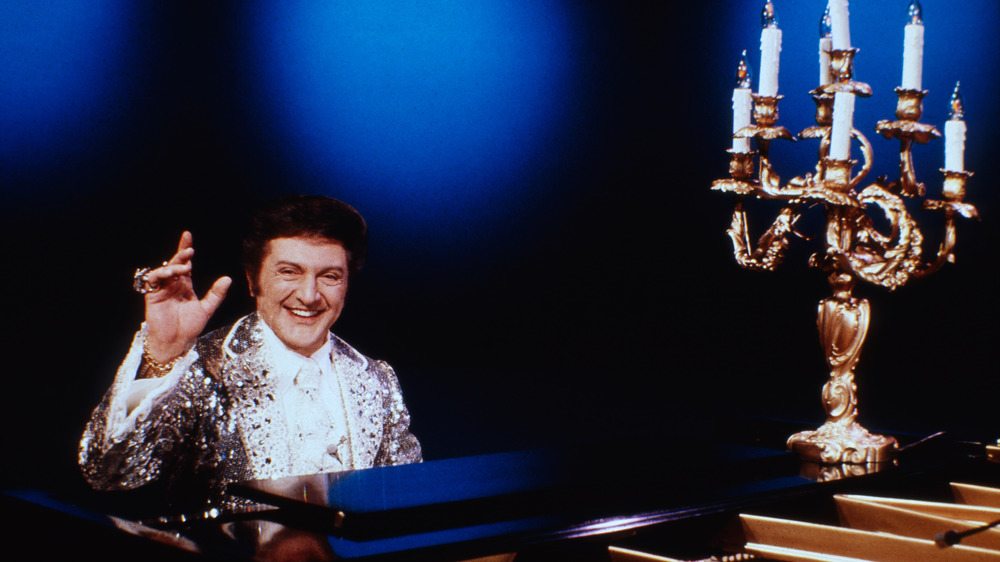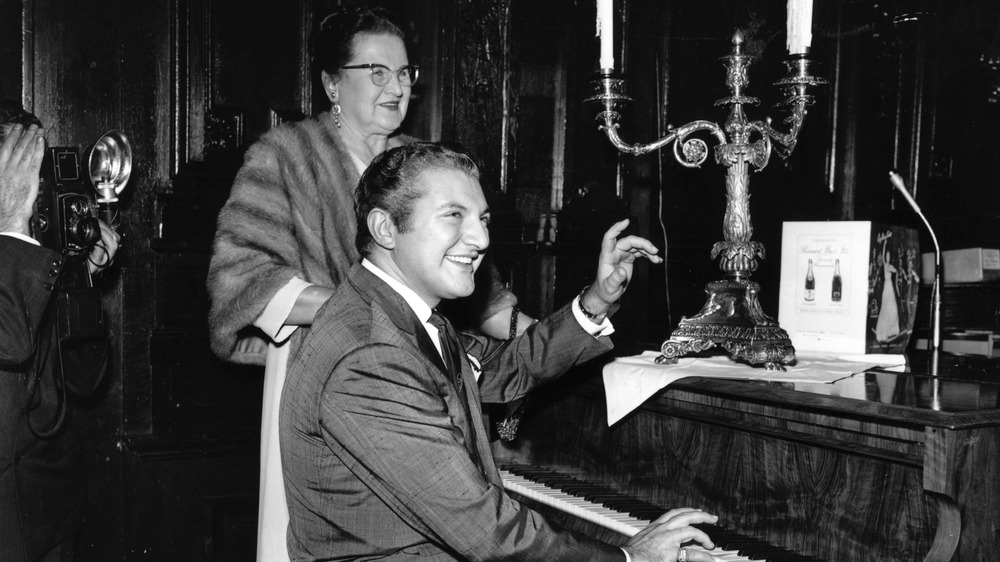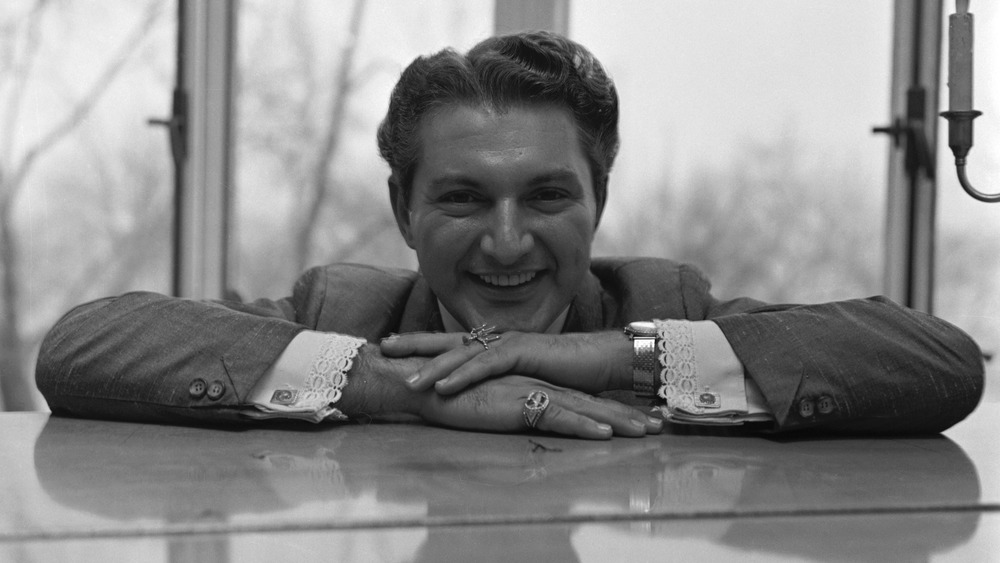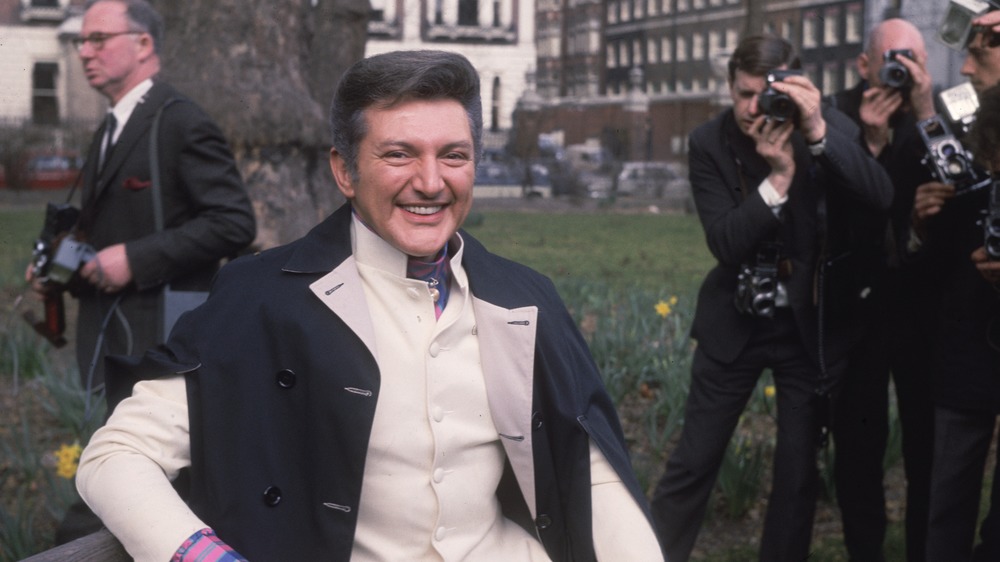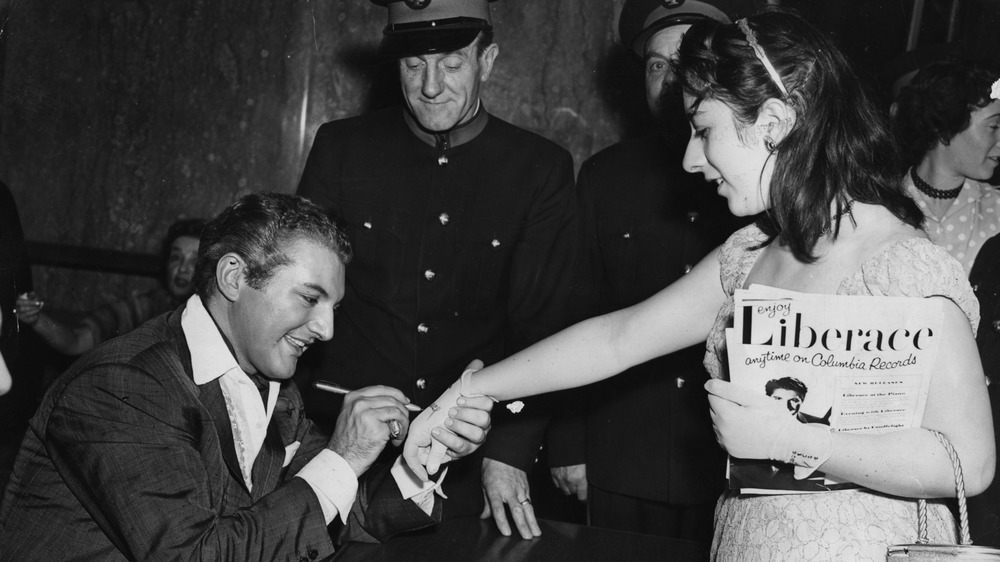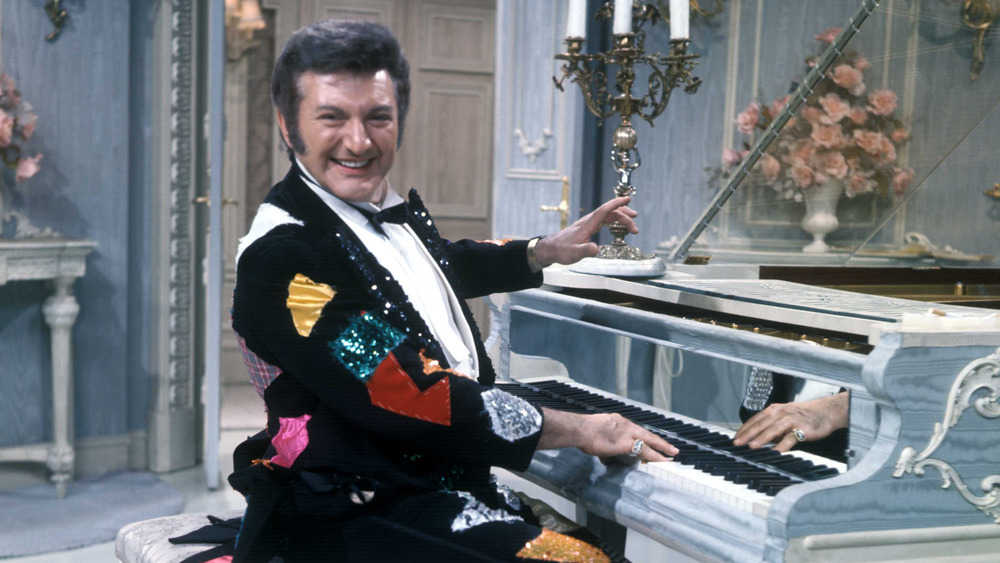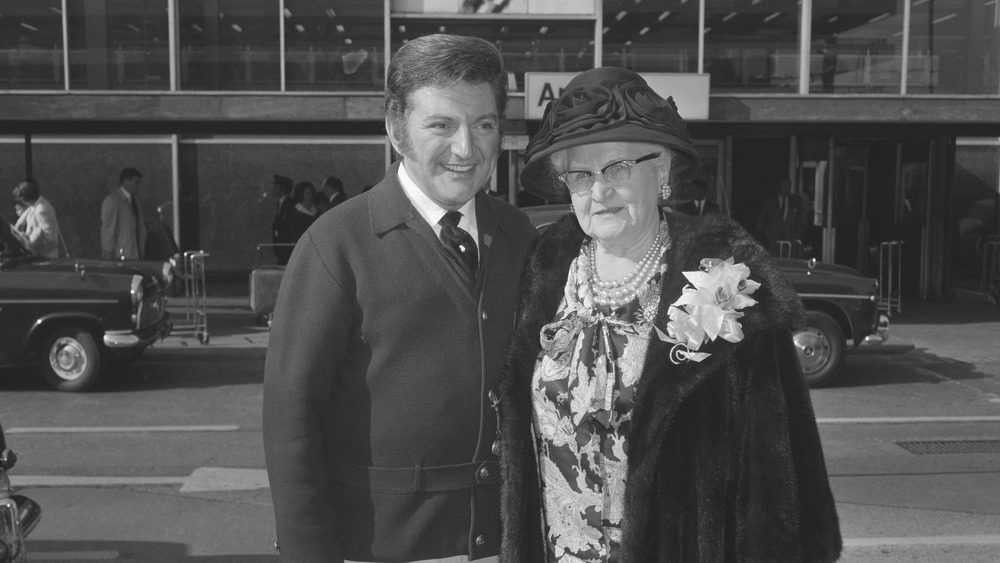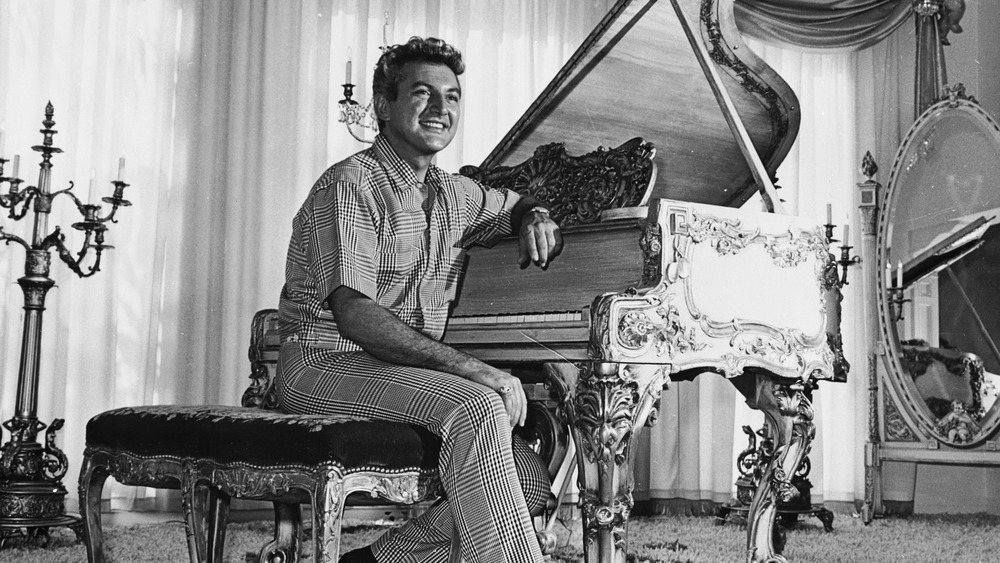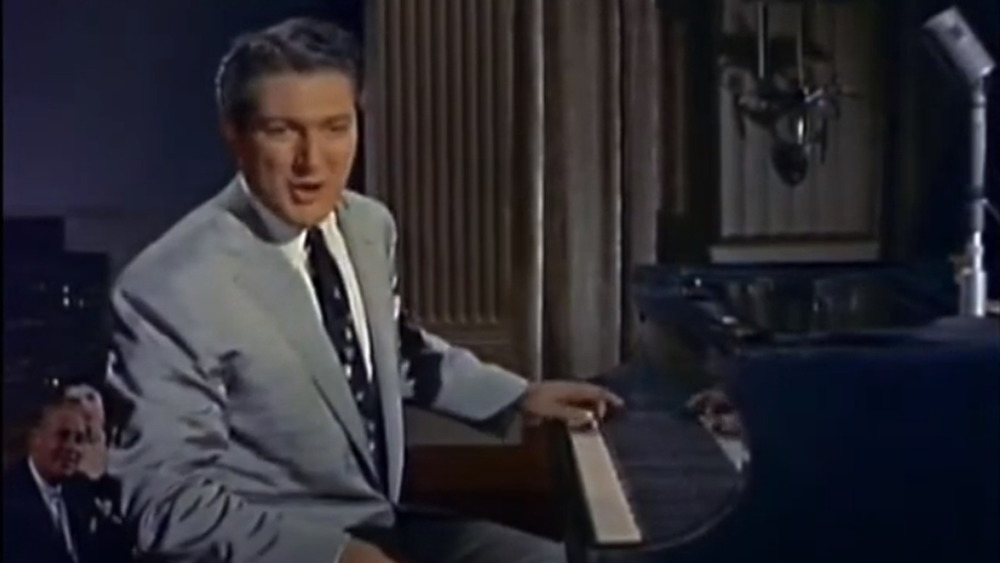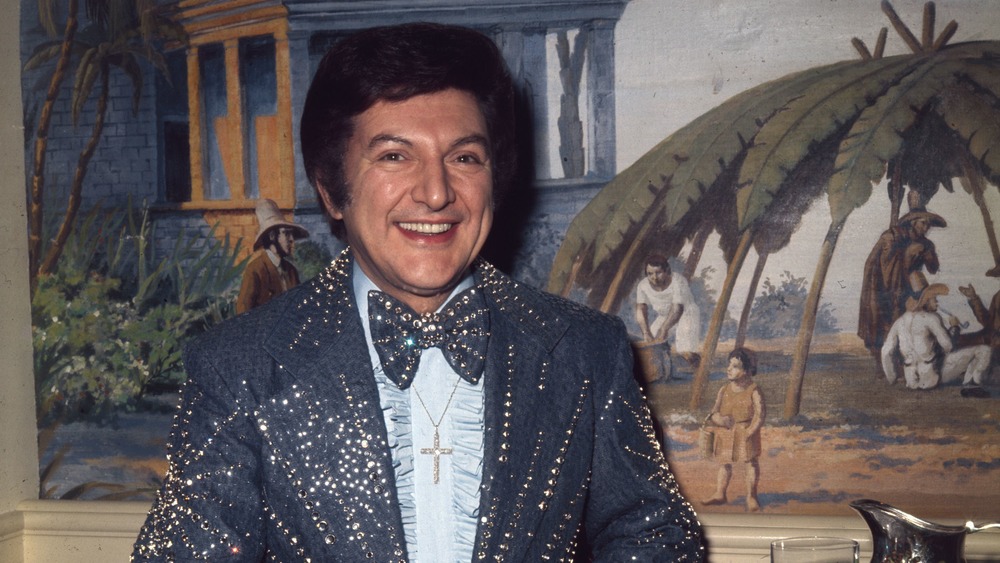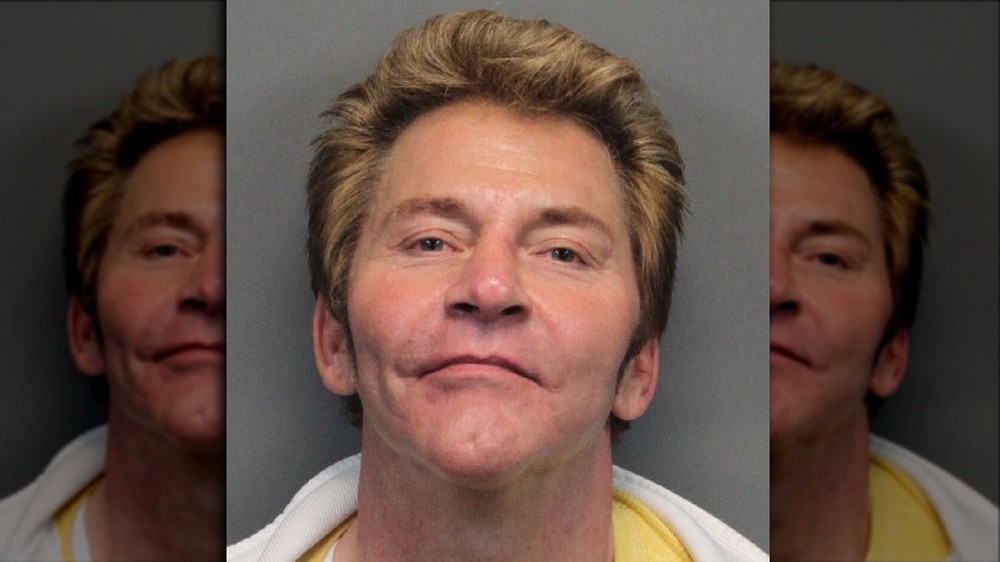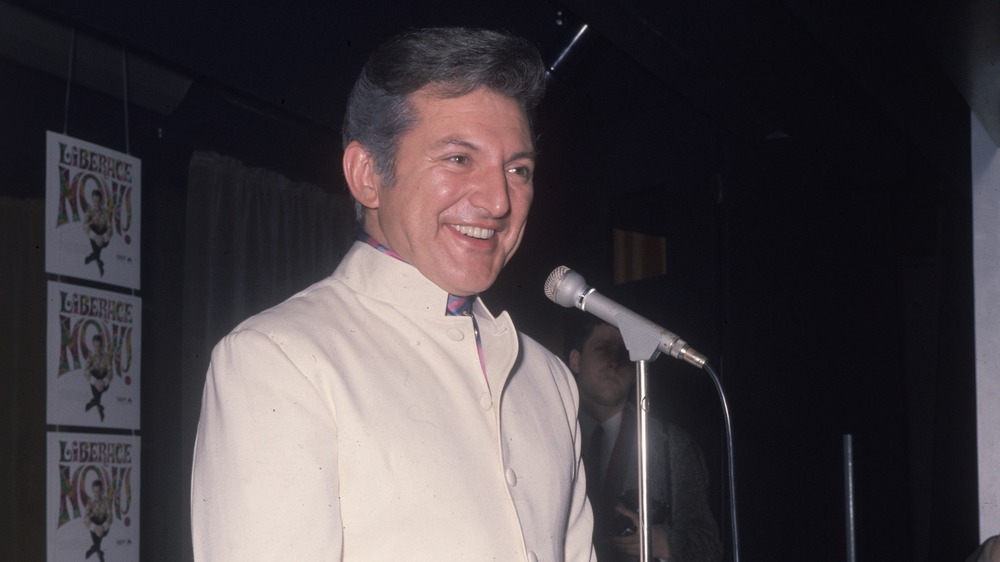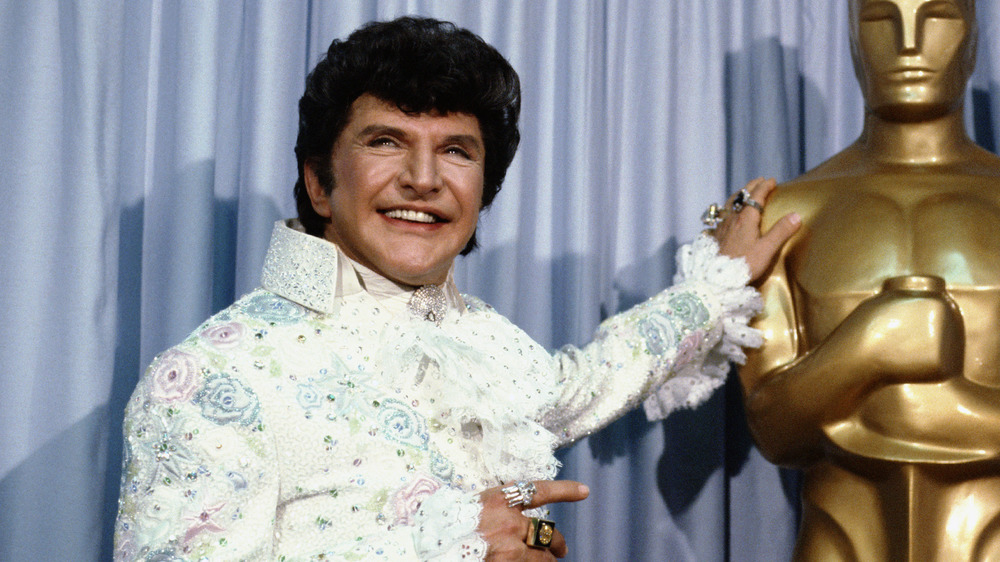The Tragic Real-Life Story Of Liberace
The first name in showmanship for half a century, Liberace defined glitz and glamour. A piano prodigy who abandoned the formalism of the concert hall for over-the-top theatricality, Liberace more than made up for his shortcomings as a musician with his unparalleled skills as an entertainer. Decked out in a white fur coat with a 16-foot train behind his shimmering grand piano, Liberace made Vegas-era Elvis Presley look like a pauper.
On stage, Liberace oozed charisma and created an intimate rapport with his fans that belied his flashy stage clothes and ostentatious style. Although he dressed in rhinestone-encrusted capes, was chauffeured to his concerts in a Rolls-Royce, and made his appetite for luxury a constant punchline in his stage banter, Liberace, in his public life, never exuded the aloof attitude typical of so many celebrities. To his millions of devotees, he was far more than a musical idol. Liberace was a star of the people who brought culture, albeit filtered through his own unique predilections and quirks, to the common folk.
However, when the stage lights dimmed and the curtain closed, Liberace was a man at war with himself. Liberace fought endlessly to preserve his privacy in an era of rampant homophobia and intolerance. Fearing the loss of his predominantly female fanbase, he created an illusion, which ultimately only he believed. In the end, Liberace's facade came crashing down as his death laid bare his most intimate secrets. This is the tragic real-life story of Liberace.
Liberace's childhood was marked with poverty and sickness
Born Władziu Valentino Liberace on May 16, 1919, in West Allis, Wis., in suburban Milwaukee, Liberace, known as Walter to his family, was the third of four children. One of a pair of identical twins, Liberace's brother died at birth.
The son of immigrant parents, Liberace was of Italian-Polish descent. His Italian father, Salvatore Liberace, came from the fishing village of Formia near Naples. A professional musician, Salvatore instilled a love of music in his son. Liberace's mother, Frances Zuchowska Liberace, hailed from Poland and had been a concert pianist before marriage. Despite her musical background, Frances discouraged her children's pursuit of music lessons as an extravagance too expensive for the cash-strapped family. As documented in Darden Asbury Pyron's 2000 biography, Liberace: All American Boy, Liberace's parents fought constantly about their finances, but Frances' main complaint was over the expense of music. "Frances groused bitterly about spending money on luxurious music lessons," Pyron writes. According to the author, Frances felt her children would be better served in life by learning a "practical" trade like the family's struggling grocery business. Nevertheless, the tyrannical Salvatore's single-minded insistence on his children becoming professional musicians won out.
A fragile child, young Liberace was plagued with bouts of pneumonia, and his mounting medical bills worsened the family's precarious financial situation. Despite his illnesses, Liberace's talents manifested early. At age 4, he was already pecking out popular tunes on the piano by ear. At 7, he could play Mendelssohn's A Midsummer Night's Dream.
He faced overbearing parents and childhood bullies
Young Walter Liberace always knew he was different from his classmates, especially the boys in his neighborhood. A fastidious child, he disliked sports and outdoor activities. "It wasn't that I had anything against the games," Liberace wrote in his 1973 autobiography. "It was just that you got dirty playing them." Alienated from his peers, Liberace turned to domestic pursuits such as cooking and sewing. On his way to school, children taunted him with shouts of "momma's boy" and "sissy." When Liberace began having crushes on his male teachers at age 10, he became wracked with guilt and began to question his sanity.
Liberace's father was a proud man whose devotion to music and self-image as a professional musician conflicted with the financial realities of his home. Relegated to factory work he considered beneath him, he took his frustrations out on his family. To his embarrassment, his wife, Frances Liberace, ran a small grocery out of their home to make ends meet. Liberace learned to walk a fine line to keep both his artistic father and practical mother happy. Later in life, Liberace would find himself estranged from his father, who balked at his son's embrace of popular music over the classics. Although Frances would be a constant in his life until her death in 1980, the pianist privately resented her clinging nature as "completely suffocating and damn near incestuous." When she passed away at 90, Liberace remarked to his assistant/partner Scott Thorson that he was "finally free."
Liberace's parents disapproved of his work in nightclubs
Liberace exhibited a talent for music early in life. Before the age of 10, he could perform complex classical pieces and replicate popular songs by ear. Liberace's first musical idol was piano virtuoso Ignacy Padereweski. Pouring over Padereswki's recordings, 8-year-old Liberace meticulously studied the musician's interpretations of Bach, Beethoven, Liszt, and Mozart until he could execute them flawlessly.
As Liberace grew older, he discovered that his musical ability was a way to gain acceptance among his peers. As detailed in Liberace: The True Story, by Bob Thomas, the once-alienated Liberace was constantly invited to liven up birthday parties with the latest tunes. The prodigy was even allowed to leave grammar school early in the afternoon to play at high school dances.
Classical studies, recitals, and competitions ruled 14-year-old Liberace's days. His nights belonged to ragtime and honky-tonk music, which he played at Milwaukee roadhouses and bars. Hiding his lucrative night job from his parents, he would explain that he and his band were playing church socials. When Frances and Salvatore Liberace discovered what their underage son was really doing, they were livid. Caught up in a police raid of a men's fraternal organization party that included stag films and a stripper, an incensed Salvatore picked up his son at the police station, chiding him that he could no longer play at such unsavory venues. Nevertheless, he relented when he saw how much money his son was making. By age 16, Liberace was the family's main breadwinner.
Liberace was lambasted by critics
By 1945, Walter Liberace had gone from being a musical prodigy to a celebrity entertainer known for his pop sensibilities and flair for showmanship. Dropping his first name, he was billed simply as Liberace. Although classical music still held a place in his performances, he mixed it with an abundance of popular music. "I was happy to play classical music . . . but the people I played classical music for were really just a handful of musical purist types. . . I really longed to please the man on the street," Liberace said in an interview clip featured in a 1995 episode of Biography.
Liberace's florid style and engaging personality made the pianist perfect for television. Starring in his own syndicated program called The Liberace Show, Liberace took to the airwaves in 1953. As cited in Liberace: An American Boy, at the height of the show's popularity, it was more watched than I Love Lucy and generated 10,000 pieces of fan mail per week.
Despite his popular acclaim, music critics savaged Liberace. Howard Taubman of The New York Times described Liberace as ". . . not much more than a parlor pianist who ought to be kept in someone else's parlor." Although the poor reviews hurt him, Liberace made them part of his act. "I thought I'd be out here alone. . . ," Liberace quipped to the audience on the second night of a sold-out San Francisco performance, "Honestly, I felt so terrible when I read those reviews yesterday that I cried all the way to the bank."
Liberace was forced to hide his sexuality
Perhaps the greatest tragedy of Liberace's life was his lifelong denial of his sexuality. As a gay man in the public eye in the mid-20th century, Liberace had little choice but to hide his private life or lose his career and fanbase to the intolerance of the times.
Liberace's conflicted feelings came with childhood. In an era when being gay was considered a mental illness, young Liberace obsessed over his sexuality to he point of fearing he was insane. "... realizing he was gay devastated him," former live-in partner and chauffeur Scott Thorson, author of the tell-all, Behind the Candleabra: My Life With Liberace, writes. "He had to be crazy, sick, out of his mind, he thought, to be attracted to men."
Wracked with guilt and terrified at the consequences of his family discovering his sexual orientation, a confused Liberace turned to his Catholic faith in hopes of quelling what he felt were unnatural urges. Briefly, the musician considered entering the priesthood.
Politically and religiously conservative, Liberace publicly condemned the gay lifestyle throughout much of his career while keeping his private life under a shield of secrecy. He vehemently and repeatedly denied being gay in the press and publicly "dated" women to add plausibility to his deception.
Liberace's mother was assaulted at the star's home
Liberace's success in the 1950s was tainted with scandal, lawsuits, and tragedy. On July 19, 1957, Liberace was delivering a righteously indignant deposition in a $25 million libel suit against the gossip rag Hollywood Confidential. The entertainer had vowed to bring the tabloid down after it had printed a salacious story intimating that the famous pianist was gay.
Just hours after his appearance in a Los Angeles courtroom, Liberace's mother Frances, a guest at the star's lavish Sherman Oaks Home, ventured out with a bag of garbage to burn in a garage incinerator. Seemingly out of nowhere, two masked men jumped the 65-year-old woman, knocking her to ground and viciously kicking her in the back. The Los Angeles Times quoted her statement to the police — "They had black hoods with slits for their eyes. They also had some kind of covering, probably stockings, over their shoes," Frances Liberace said. "I screamed and they chased me into the kitchen. There, one of them grabbed me, hit me or threw me down on the floor. One of them kicked me in the back. I heard one of them say, 'This will give him something to laugh about.' Then I fainted."
As documented in Liberace: The True Story, Liberace returned to find his house swarming with police. Investigators, suspecting the attack was an act of revenge, inquired if the entertainer had any enemies. Although no suspects were ever apprehended, Liberace and his family conjectured that the crime was related to the Confidential suit.
Liberace nearly died the day after JFK was assassinated
Liberace was known for his elaborate stage costumes. Multiple wardrobe changes were a hallmark of his shows beginning early in his career. Ironically, Liberace's clothing nearly cost him his life on Nov. 23, 1963. While preparing for a show at The Holiday House in Pittsburgh, the pianist noticed that some of his stage clothes had become soiled. With a blizzard brewing outside his hotel room, the performer fretted over his wardrobe. His costumer, Bob Fischer, was busy on an errand, and hotel staff wouldn't have the clothing cleaned by showtime.
With the clock ticking, Liberace made a decision which he called "idiotic" in his autobiography. After purchasing a gallon of dry cleaning fluid, the star attempted to do the job himself in the unventilated confines of his hotel room. As detailed in Liberace: An American Boy, the entertainer, suddenly feeling ill, laid down for a nap. Soon, Liberace was rousted from his sleep by Fischer who, smelling the overwhelming fumes, chided him for cleaning his costumes himself.
Liberace wouldn't make it through his performance. Rushed to a nearby hospital, doctors diagnosed him with renal failure brought on by carbon tetrachloride poisoning, When his kidneys failed to resume normal function, Liberace was told to "put his house in order." Miraculously, Liberace recovered. His brush with death left him changed, however. Upon leaving the hospital, he embarked on a spending spree that would last his entire life. A changed man, Liberace showered his friends and family with money and expensive gifts.
The singer's attempt at a movie career flopped
In the 1950s, Liberace was a hit in concert halls, nightclubs, and on television. However, there was still one medium the piano man longed to conquer — the movies. Liberace had appeared in a small role in 1950's South Sea Sinner, starring Shelley Winters, but, by the middle of the decade, the musician yearned for a shot at movie stardom.
As recounted in the Biography episode "Liberace: Mr. Showmanship," studio head Jack Warner caught Liberace's act in San Francisco and thought his charisma would translate well to the big screen. Although both his fans and management warned him against the move, Liberace made his film debut in 1955 in Sincerely Yours. In the film, Liberace stars as pianist Tony Warrin, a plucky musician who loses his hearing just before he's scheduled to play his dream gig at Carnegie Hall.
Upon its release, reviews for the movie were mixed. Critics praised Liberace's patented showmanship and sincerity but noted that the entertainer was "nobody's Barrymore." When the film flopped. Warner Brothers placed the blame squarely on Liberace's sequined shoulders. To ensure against another loss, the studio bought back Liberace's two picture contract. In turn, Liberace would blame Sincerely Yours for a downturn in his popularity.
Liberace's life was plagued with libel lawsuits
Liberace's life off stage was marked by an endless struggle to protect his privacy. Considering the social and legal ramifications of being a gay man in the public eye in conjunction with his dedication to his Catholic faith, Liberace, despite his overtures to camp in his performances, vehemently insisted he was a heterosexual until his death in 1987.
Desperate to keep his secret life hidden, Liberace repeatedly challenged press accusations questioning his sexuality in court. His first legal battle came in 1956 when British tabloid The Daily Mirror obliquely characterized the entertainer as gay, referring to him as a " . . . luminous, quivering, giggling, fruit-flavoured, mincing, ice-covered heap of mother love." Liberace fought back hard denying that he was gay and soundly denouncing the gay lifestyle. The musician emerged victorious after a three-week trial, collecting over $22,000 in damages.
In 1957, the notorious gossip magazine, Hollywood Confidential, published a story alleging that Liberace made unwanted sexual advances on an unnamed, male press agent. Liberace filed a $25 million libel suit against Confidential. The magazine finally settled with Liberace for $40,000, most of which the pianist donated to charity.
Liberace's ex-partner attempted to sue him for palimony
Liberace fought his final legal battle just years before his death when a former employee and live-in lover attempted to sue the performer for palimony. In 1977, 18-year-old Scott Thorson met Liberace through dancer Bob Black, a friend of Liberace's Las Vegas show choreographer Ray Arnett. As Thorson writes in his 1988 book, Behind the Candelabra: My Life With Liberace, the two established a rapport when Thorson, a former veterinarian's assistant, recommended a treatment for Liberace's aging and blind poodle. Later, the entertainer tearfully confided his loneliness and inability to trust anyone to him and asked Thorson to work for him as a personal companion and assistant. He would also appear in Liberace's Vegas show driving the performer on stage in a Rolls Royce.
Thorson alleges that he and Liberace embarked on a five-year romantic relationship that Thorson assumed was monogamous. Describing the entertainer as both generous and controlling, he claims that Liberace encouraged him to get plastic surgery in an effort to mold him into a younger version of himself. According to Thorson, their relationship ended because of his drug use and Liberace's repeated infidelities. When Liberace fired him in 1982, Thorson filed a $13 million palimony suit, the first of its kind in United States history.
Despite denying Thorson was his lover in court depositions and repeatedly declaring his heterosexuality, Liberace settled out of court with his former employee, awarding Thorson $75,000 in cash, three cars (including a 1960 Rolls Royce), and two dogs.
Liberace's tragic death
By late 1986, there was no denying that Liberace was not a well man. Having lost considerable weight, the entertainer allayed the concerns of friends and acquaintances claiming that he had overdone a watermelon diet. Throughout November of that year, he played Radio City Music Hall with the Rockettes in what would be his final concert performances. Although he publicly denied his sickness to the end, his declining health couldn't be ignored. He called Scott Thorson to enquire about his former lover's health, stopping short of admitting that he had contracted AIDS.
According to Liberace: An All American Boy, the entertainer discovered he was HIV positive in August of 1985. His condition worsened steadily over his remaining two years. On Jan. 3, 1987, Liberace entered Eisenhower Medical Center suffering from pneumonia. Days later he was discharged to his Palm Springs home. Liberace died on Feb. 4, 1987, at the age of 67.
The denials continued after Liberace's passing
Sadly, Liberace continued his lifelong denial of his sexuality to the end of his life. As detailed in Liberace: All American Boy, he considered his AIDS diagnosis a potentially devastating blow to his public image. When The Las Vegas Sun reported Liberace had AIDS, the entertainer's PR machine once again went into denial mode threatening legal action.
Bent on maintaining his wishes, Liberace's management had his death certificate falsified. On paper, "cardiac arrest" was the cause of death. The performer's body was rushed to Forest Lawn Cemetery. Nevertheless, the truth would come out when the L.A. County Coroner's Office seized the body to perform an autopsy based on suspicions that the performer had a contagious disease. The post-mortem analysis confirmed what the public had long intimated. Liberace had indeed died of AIDS. Ironically, Liberace's incessant denials created exactly the kind of spectacle from which he so fervently hoped to be spared in death.
